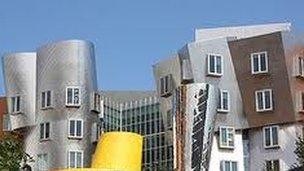To boldly go: America's new tech frontier
- Published

It is estimated that 25,000 active firms have been founded by MIT alumni Pic: Jon Fildes
There are places where you can almost touch the economic power and see global change taking place.
Standing on the Bund in Shanghai, for instance, watching the river cargo hurry to market, and looking across to the gleaming Pudong business district.
I've been stuck in the congestion of call centre workers in Bangalore, and marvelled at the scale of business education in the suburbs of Delhi, where eager young Indians skill up to take on the world.
Another such place is Kendall Square in Cambridge. It's the subway stop for the Massachusetts Institute of Technology, just before the Red Line crosses the Charles River to Boston.
In the spring sunshine, earnest post-exam students are discussing their summer internships. Professors stroll purposefully, fulfilling the stereotypes of overgrown moustaches and supersized bow-ties.
Around it you can find high rise office blocks bearing the names of the technology giants. But look closer and you can see numerous small technology companies, from software to pharmaceuticals, crowding for space with venture capital firms.
I've come to this part of the US to find out more about the ecology of America's start-up culture, and its links into Scottish technology. You can hear more soon, on the Business Scotland programme on BBC Radio Scotland.
Business in the bricks
To offer a small preview, the good news for Scotland is that it seems to be doing many of the things that are done here to create the environment for a thriving technology sector. And Scottish universities already have world-class strengths in science and technology.
Americans have told me how much trade and investment agencies at UK and Scottish level are keen networkers, and both MIT and nearby Babson College host Scotland's best entrepreneurial prospects on intensive executive courses.
The less good news is that others are also learning the same lessons, and between Massachusetts and Silicon Valley in California, America has both the financial clout and the innovative momentum to keep its lead.
The numbers are awesome. As I learned from the Edward Roberts, 50 years an MIT-man and professor of entrepreneurship at MIT's Sloan School of Management.
His study of the economic impact of MIT points to more than 25,000 active companies founded by living MIT alumni. They employ more than three million people, with turnover of more than $2 trillion (more than £1,300bn).
If the MIT community were a country, he reckons it would be the world's 11th biggest.
Then look at the impact on the state of Massachusetts itself. It's got a population of around five million - the same as Scotland. This one university (and of course, it's not alone - Harvard is just up river) can take credit for creating firms that represent around a quarter of the state's private sector.
Companies with roots in MIT skills turnover $164bn (£105m).
Those numbers are getting a bit elderly, despite a couple of updates on the 2006 baseline.
Professor Roberts is about to launch a new survey of alumni, confident that the pace of entrepreneurial activity by MIT graduates has picked up pace, and that it should give the evidence to ensure MIT's arch-rival in California, Stanford, is put clearly in its place.
Sharing and saving space
I haven't been the only visitor to MIT this week asking how this has happened. David Cameron swung by ahead of me, eager to find out what UK plc can learn.
The secret, says Roberts, is in the culture of the place, as if in the bricks of the building. For 150 years, MIT has been about learning and doing, and for more than 100 years, its faculty members were spinning out their technology into companies.
I've been hearing from one lawyer who specialises in the tech sector, who represents at least 25 members of MIT faculty. They don't all get rich, but some do - one of them sold on his business, providing routing via enhanced internet algorithms, for $4bn.
It's helped by having such a strong success rate that it can have the pick of go-getting students from America and around the world. And Roberts' research shows those from overseas are even more entrepreneurial than American classmates, not only in creating companies when they return home, but even more effective in setting up and growing companies in the Massachusetts area.
It also helps that the disciplines of science and technology live cheek-by-jowl with entrepreneurs. This is a place where innovators in both technology and science can collaborate on future products, at the MIT Media Lab, where the Prime Minister called in on Wednesday.
It doesn't have much to do with media in a conventional sense, but it is addressing many of the big challenges of future life, for instance in congested urban living, where it is developing a driverless car that you can arrange to collect you. It may also be able to fold itself up into a fifth of the usual parking space.
And for those facing limited living space, the Media Lab is developing a one room apartments which transform themselves between the functions of different rooms in a bigger home.
Incidentally, this drive towards sharing space and resources rather than owning and controlling them, this seems to be a theme worth watching: while New York prepares to get its version of the rental bikes already found in central London or Paris, the Boston Globe reported on Thursday on a car rental scheme in which you drop off your car at Logan Airport as you depart.
To save on parking fees and to earn some income from it, an agency will hire it out for someone else to drive. If they fail to find a match, the parking's still free.
Dealmaking at Ye Olde Cottage
The other part of the MIT ecology that's a big advantage to Massachusetts is its well-developed funding markets. To find out more, I took a local insider's advice, and went for breakfast at a small, traditional diner on the quaint main street of the suburb of Weston, just outside Boston's ring road, Route 128.
That road gave its name to Boston's technology cluster, at least 50 years ago. The quality of life brought tech firms out to the leafy suburbs around it, like Waltham and Weston.
Ye Olde Cottage diner - established in 1952, with nothing much changed since then, while claiming 'Number 1 Red Sox fan' status - is the place to find the deals being done, over easy with hash browns and an endless supply of coffee from the wise-cracking Dawn Rodowicz.
John Landry was meeting one of the 40 entrepreneurs in whom he's invested. He got into software in the early 1970s, when it was in its infancy. When he told his father, a banker, Clancy Sr asked what on earth he knew about women's lingerie.
Since then, he's been chief technology officer in ten start-up companies, and subsequently sold them all on. At one point, it made him the tech boss at the dominant business software provider, Lotus, before it, too, was sold on.
That process of creating and selling on leaves the Boston area with a challenge familiar to Scots - it lacks the big corporate headquarters. They're more often to be found in Silicon Valley.
Top dollar
And John Landry observes an interesting new phenomenon in the development of tech firms' ecology. The global giants of Microsoft, Google, Facebook and Twitter are no longer prowling around in a search for the next big thing, paying top dollar for ideas and the people behind them.
They are headed by tech geeks and entrepreneurs who want to develop those ideas in-house, making their own companies as innovative as possible. That's what drove Google to launch its own music streaming business this week, rather than buying up the existing market leaders, Pandora or Spotify.
Rather than waiting to be bought, that means the minnows have to look to "build a business", points out Landry. That means finding an income stream.
Rather than wait for the ideas to come to him, this serial investor is creating another company. Using his own software coding skills, he has developed a new product for curating what you find on the internet. Inspired by his own search for recipes and gardening tips, it launches at the end of June.
As he told his wife over dinner this week, the difference between doing it now and 40 years ago is that he has time to have dinner with his wife.
It's no longer necessary, at his level, to get stressed by the process of starting up. Relaxing at Ye Olde Cottage, the latest of America's boundless frontiers, he reckons that it's now possible to create a small family firm with global impact.
- Published10 May 2013

- Published23 January 2013